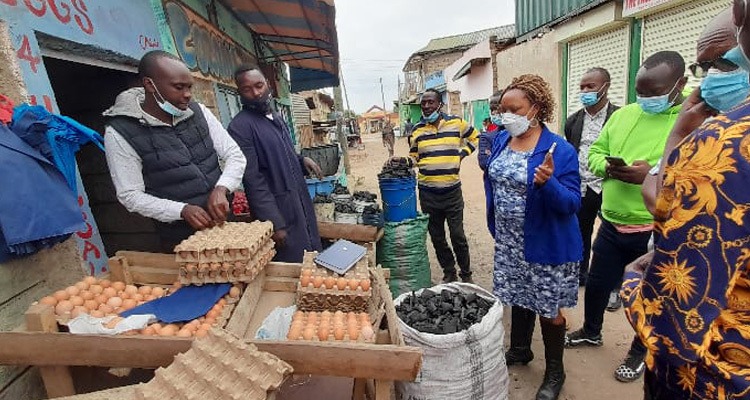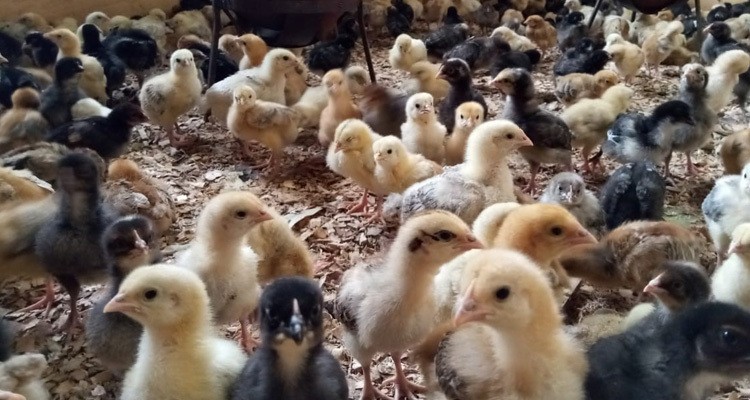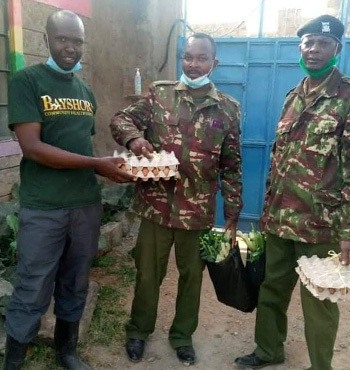Photos courtesy of EMAC

Empowering Marginalized Communities (EMAC), an AJWS grantee partner in Kenya, has two major goals supporting their local network of LGBTQI+ organizations and fighting against anti-LGBTQI+ stigma in their communities. Amazingly, they found a way to meet both in the most unlikely place: a chicken coop.
EMAC supports grassroots groups of LGBTQI+ folks, sex workers and people who inject drugs across the Eastern part of Kenya. Program leaders at EMAC had the unconventional idea to begin raising chickens to make money to support the work of their partner organizations. With wood, wire and a lot of determination, EMAC built a hatchery in 2017, and so the poultry project was born.
As the project leaders gained confidence and skill in raising chickens and feeding them the optimal amount so they can healthily reproduce, the hatchery soon produced a whopping 5,000 chicks each month. EMAC began bringing in a steady income from the poultry project and used it to support their partners’ work.
At the beginning of 2020, EMAC realized that its LGBTQI+ partners would need far more support as their other sources of funding had dried up. Due to the uncertainty caused by the pandemic, funders stopped making grants that their partners had relied on. Dozens of groups faced the possibility that they would have to close their doors, giving LGBTQI+ people who relied on their services nowhere else to turn.
EMAC realized that by expanding the poultry project they could generate more revenue and provide their partners with the crucial resources they needed. AJWS was able to provide EMAC with the funding to scale up their chicken breeding program so its partners could participate and keep themselves afloat.
EMAC also used these funds to train beneficiaries who wanted to begin their own poultry projects.
“We were able to have the projects running successfully and we have 11 direct partners rearing chickens and selling eggs from our cohort” Executive Director Nelson Mutugi said.

Once EMAC’s partners had their own poultry projects running, they were able to self-sufficiently earn their own income and support their own advocacy work.
A partner called Men in Action Supporting Men (MIASM) did not have a funder during a 7-month period, so the income they accrued through selling eggs and chicks at their hatchery allowed them to remain open. They were thrilled to be able to support themselves through this tough time with the money generated from their hatchery.
From the very earliest days of EMAC, both staff and the communities they support have endured police raids, and violence from neighbors and local administrators, Nelson shared. Many community members falsely considered EMAC a homosexuality recruitment center. The community hostility has made it challenging and, at times, dangerous for EMAC to do its work over the years.
EMAC made huge investments in dialogue and training community members who made its staff and partners feel unsafe in the community.

Incredibly, once EMAC created the poultry project, as a remedy to the funding problems of its partners, they were no longer viewed as a ‘homosexuality recruitment center” instead they are referred to as a poultry farm.
The poultry project has changed the hearts and minds of many members of the general public toward EMAC, Nelson shared. Before this project, volunteers at EMAC feared attacks by residents. Now volunteers feel gratitude from locals for providing a crucial source of local produce.
“There was a drastic perception shift, as our organization was viewed as a center that recruited young men into homosexuality”, said Nelson. But once the poultry projects were introduced, EMAC started to be recognized for the critical role it plays in the community.

